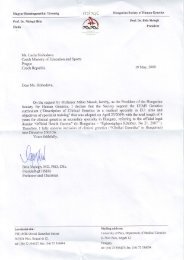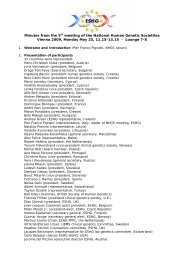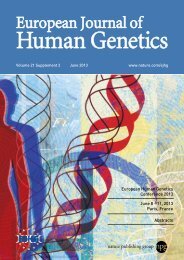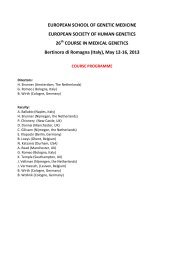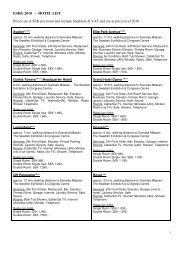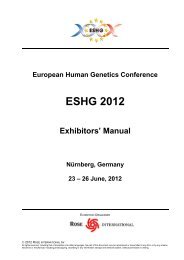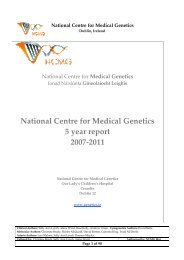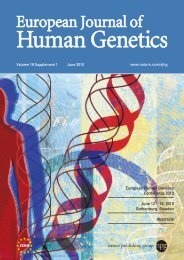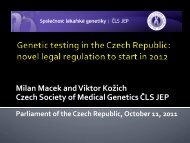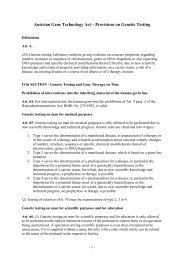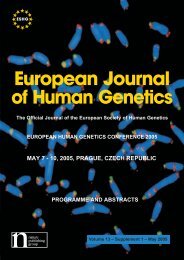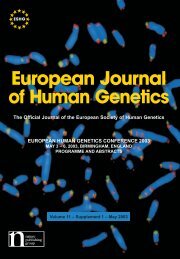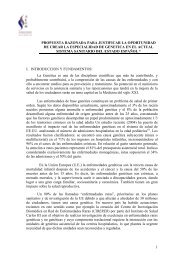2008 Barcelona - European Society of Human Genetics
2008 Barcelona - European Society of Human Genetics
2008 Barcelona - European Society of Human Genetics
Create successful ePaper yourself
Turn your PDF publications into a flip-book with our unique Google optimized e-Paper software.
EMPAG Posters<br />
efficient predictor for the level <strong>of</strong> functioning and perceived pain in the<br />
case <strong>of</strong> patients suffering from pulmonary cancer and digestive tube .<br />
Overall, the results show that the negative attributional mechanisms<br />
coupled with other socio-cognitive variables can increase the level <strong>of</strong><br />
depression for patients diagnosed with cancer, on the background <strong>of</strong><br />
lack <strong>of</strong> control and / or deficient functioning.<br />
EP10.10<br />
An international online survey <strong>of</strong> genetic health pr<strong>of</strong>essionals’<br />
practice involving family communication<br />
L. E. Forrest 1,2 , M. B. Delatycki 1,3 , L. Curnow 3 , L. Skene 4 , M. Aitken 1 ;<br />
1 Murdoch Childrens Research Institute, Parkville, Australia, 2 The University <strong>of</strong><br />
Melbourne, Parkville, Australia, 3 Genetic Health Services Victoria, Parkville,<br />
Australia, 4 The University <strong>of</strong> Melbourne Law School, Parkville, Australia.<br />
Communication <strong>of</strong> genetic information in families is becoming increasingly<br />
important due to the low numbers <strong>of</strong> at-risk family members that<br />
contact genetic services for counselling . Genetic counsellors and clinical<br />
geneticists (genetic health pr<strong>of</strong>essionals) are responsible for educating<br />
and discussing the familial implications <strong>of</strong> a genetic diagnosis<br />
with probands and consultands . However, genetic health pr<strong>of</strong>essionals’<br />
practice in family communication is largely unexplored .<br />
This is the first international survey to be developed and validated<br />
which aims to explore genetic health pr<strong>of</strong>essionals’ current practice<br />
involving family communication . The survey was administered online<br />
and participants were recruited through the membership email lists <strong>of</strong><br />
organisations with clinical geneticists and genetic counsellors as pr<strong>of</strong>essional<br />
members .<br />
The survey was completed by 628 genetic health pr<strong>of</strong>essionals . The<br />
results demonstrate that the majority <strong>of</strong> genetic health pr<strong>of</strong>essionals<br />
always identify which relatives are at-risk (95 .6%) and encourage<br />
communication about the genetic condition to these family members<br />
(95 .4%) . There were generally no differences between clinical geneticists<br />
and genetic counsellors practice (p>0 .05) when counselling probands<br />
about at-risk relatives, except when discussing which relatives<br />
are at-risk <strong>of</strong> developing Huntington disease (p=0 .02) . Genetic health<br />
pr<strong>of</strong>essionals’ practice did not vary greatly when compared across four<br />
scenarios which each involved a genetic diagnosis <strong>of</strong> haemochromatosis,<br />
familial adenomatous polyposis, Huntington disease or a balanced<br />
reciprocal chromosomal translocation .<br />
The results <strong>of</strong> this survey provide an insight into genetic health pr<strong>of</strong>essionals’<br />
practice internationally and provide information for the development<br />
<strong>of</strong> evidence-based practice for genetic and non-genetic health<br />
pr<strong>of</strong>essionals in the area <strong>of</strong> family communication .<br />
EP10.11<br />
Genetic counseling in the muslim World : the challenges<br />
A. I. Al-Aqeel;<br />
Riyadh Military Hospital/ King Faisal Specialist Hospital, Riyadh, Saudi Arabia.<br />
Genetic counseling is the process in which an individual or a family<br />
obtains information and advice about a genetic condition that may affect<br />
the individual, his progeny, his relatives, or the family as a whole .<br />
Based on this knowledge he can take the pertinent decision regarding<br />
marriage, reproduction, abortion and health management .<br />
Genetic counseling includes five themes, medical management, risk<br />
determination, risk options, reproductive decision making, and support<br />
services .It involves a partnership <strong>of</strong> physicians, genetic counselors,<br />
and genetics support groups . The majority <strong>of</strong> clinical geneticists subscribe<br />
to the principle <strong>of</strong> non-directive ness: information about risks,<br />
natural history, treatment, and outcome are presented in a balanced<br />
and neutral manner, but decisions about reproduction are left to the<br />
family .<br />
Public health authorities are increasingly concerned by the high rate <strong>of</strong><br />
births with genetic disorders especially in developing countries where<br />
Muslims are a majority . Therefore it is imperative to scrutinize the available<br />
methods <strong>of</strong> prevention and management <strong>of</strong> genetic disorders . In<br />
the Muslim World and in the Kingdom <strong>of</strong> Saudi Arabia (KSA), genetic<br />
counselling involves many challenges, as it has to be carried within the<br />
context <strong>of</strong> religion and culture, according to Islamic ethical and cultural<br />
background <strong>of</strong> the individual, with community-based genetic counseling<br />
in one’s own language, in the presence <strong>of</strong> paucity <strong>of</strong> expertise,<br />
resources and technology .<br />
EP10.12<br />
„Do you know why the doctor sent you?“ - characteristics <strong>of</strong> the<br />
genetic counselling process in a multicultural antenatal context<br />
in Johannesburg south Africa<br />
T. Wessels1 , C. Penn2 ;<br />
1 2 Division <strong>Human</strong> <strong>Genetics</strong>, Johannesburg, South Africa, University <strong>of</strong> the Witwatersrand,<br />
Johannesburg, South Africa.<br />
Few genetic counselling (GC) research studies have examined the GC<br />
process itself, particularly within multicultural settings . State-funded antenatal<br />
GC clinics in South Africa service culturally diverse populations<br />
and this research study aims to investigate the nature <strong>of</strong> these encounters<br />
. Using qualitative methodology, the required data is obtained from<br />
GC sessions and post-session interviews with genetic counsellors and<br />
the women using the service . GC sessions are video recorded, transcribed<br />
and analysed using thematic content analysis . The results <strong>of</strong><br />
three sessions from two counsellors will be presented. Initial findings<br />
suggest that there is an almost standard structured GC format used<br />
by counsellors which includes: establishing patient’s expectations, explaining<br />
GC role, obtaining information, providing information, facilitating<br />
decision-making and making referrals . Time spent on each aspect<br />
varies according to the women’s understanding <strong>of</strong> language and content<br />
(as assessed by the counsellor), depth <strong>of</strong> emotional engagement<br />
and counsellor’s skills <strong>of</strong> communication and relationship building .<br />
Analysis <strong>of</strong> the nature <strong>of</strong> the sessions shows some themes emerging<br />
and these include: encouraging discussions, attempts to connect,<br />
clarifying techniques, simple language and patient beliefs . This initial<br />
analysis showed heightened counsellor awareness <strong>of</strong> the need to use<br />
comprehensible language to convey concepts and counsellor willingness,<br />
but difficulty in eliciting and responding to emotional content in<br />
the face <strong>of</strong> language and cultural differences .<br />
EP10.13<br />
Evaluation <strong>of</strong> genetic counselling in a hospital-based clinical<br />
service<br />
C. Serra-Juhé 1,2 , I. Valenzuela-Palafoll 1,2 , M. Del Campo 1,2 , S. García-Miñaúr 2 ,<br />
T. Vendrell 2 , L. A. Pérez-Jurado 1,2 ;<br />
1 Unitat de Genètica, Universitat Pompeu Fabra, U-735 CIBERER, <strong>Barcelona</strong>,<br />
<strong>Barcelona</strong>, Spain, 2 Programa de Medecina Molecular i Genètica, Hospital Vall<br />
d’Hebron, <strong>Barcelona</strong>, Spain.<br />
In order to ascertain the effectiveness <strong>of</strong> genetic counselling it is necessary<br />
first to evaluate how it is carried out and identify aspects that<br />
need to be improved . There are few published studies on this topic . Our<br />
aim was to evaluate the genetic counselling provided by the <strong>Genetics</strong><br />
Service <strong>of</strong> the Vall d´Hebron Hospital in <strong>Barcelona</strong> . Seventy-four out<br />
<strong>of</strong> 108 cases/families (68%) seen in clinic from February to December<br />
2007 were eligible and agreed to participate in this study . Each participant<br />
answered a questionnaire before and after the consultation .<br />
The whole survey was developed taking into account previous work<br />
and publications on the evaluation <strong>of</strong> genetic counselling . We were<br />
particularly interested to study the patient’s prior expectations and<br />
whether they had been met during the consultation, patient’s satisfaction<br />
(instrumental, affective and procedural aspects), and the level <strong>of</strong><br />
comprehension <strong>of</strong> genetic and medical information given during the<br />
consultation . Other epidemiological data, such as gender or age, were<br />
also collected . Subsequently, a statistical analysis was performed .<br />
Participants were satisfied with the genetic counselling received (mean<br />
score <strong>of</strong> 3 .42 / 4, equivalent to 85 .5% maximum satisfaction), and their<br />
expectations were met in 79% . They answered correctly 84% <strong>of</strong> the<br />
questions about medical and genetic information given to them by the<br />
geneticist during the consultation . In summary, the evaluation <strong>of</strong> the<br />
genetic counselling service was globally quite positive and allowed to<br />
identify some aspects that could be improved .<br />
EP10.14<br />
clinician-patient interaction during genetic consultation and<br />
counselling - Case study in five genetic clinics in Colombia<br />
M. C. Rodas Perez 1 , J. Powell 1 , M. Thorogood 1 , J. C. Prieto 2,3 , I. Zarante 2 ;<br />
1 Health Sciences Research Institute, University <strong>of</strong> Warwick, Coventry, United<br />
Kingdom, 2 <strong>Human</strong> <strong>Genetics</strong> Institute, Javeriana University, Bogota, Colombia,<br />
3 Bogota Health Service, Bogota, Colombia.<br />
In Colombia and Latin America, genetics services are relatively new,<br />
and little attention has been paid to the critical process <strong>of</strong> communication<br />
during genetic consultation and counselling .



